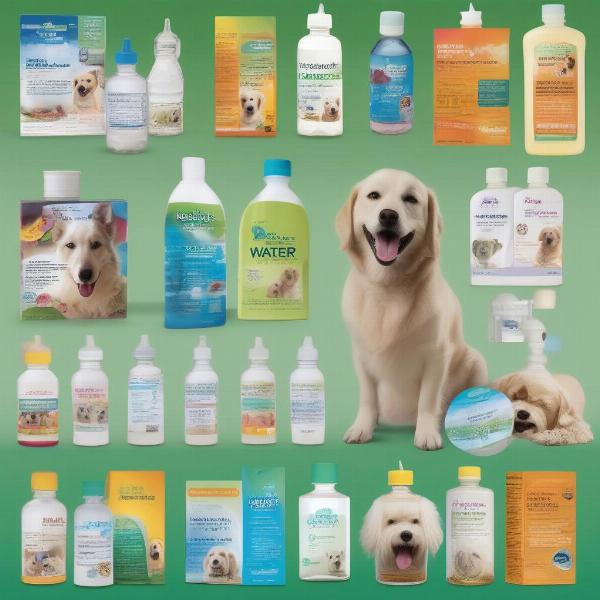Water additives for dogs’ teeth offer a convenient way to support your furry friend’s oral hygiene. These products, added to your dog’s drinking water, aim to freshen breath, reduce plaque and tartar buildup, and contribute to overall dental health. Choosing the right additive can be confusing, so this guide will explore the benefits, considerations, and options available to help you make the best decision for your canine companion.
Understanding the Need for Dental Care in Dogs
Just like humans, dogs are susceptible to dental problems like plaque, tartar, gingivitis, and periodontal disease. Poor oral hygiene can lead to pain, tooth loss, and even more serious health issues affecting the heart, kidneys, and liver. Regular brushing is the gold standard for dog dental care, but water additives can provide supplemental support, especially for dogs who resist brushing.
How Water Additives for Dogs’ Teeth Work
Water additives typically contain ingredients that help to break down plaque and tartar, neutralize bad breath, and promote healthy gums. Common ingredients include chlorhexidine, xylitol (in safe amounts for dogs), enzymes, and natural extracts like peppermint or parsley. These additives work by coating the teeth and gums with beneficial ingredients each time your dog takes a drink.
Choosing the Right Water Additive for Your Dog
Selecting the right water additive requires careful consideration of your dog’s individual needs and preferences. Look for products that are veterinarian-approved and specifically formulated for dogs. Consider your dog’s age, breed, and any existing dental conditions.
Factors to Consider:
- Ingredients: Opt for natural ingredients and avoid artificial sweeteners or colors. Check for xylitol content as even small amounts can be toxic to dogs.
- Veterinarian Approval: Choose a product endorsed by veterinarians for added assurance of safety and efficacy.
- Palatability: Some dogs are picky about the taste of their water. Look for additives with flavors that appeal to your dog or those that are unflavored.
- Specific Needs: Consider any specific dental issues your dog might have, such as gingivitis or bad breath, and choose an additive that addresses these concerns.
 Factors to consider when choosing a water additive for dogs
Factors to consider when choosing a water additive for dogs
Incorporating Water Additives into Your Dog’s Routine
Start by introducing the additive gradually to allow your dog to adjust to the new taste. Follow the manufacturer’s instructions for dosage. Monitor your dog for any adverse reactions and consult your veterinarian if you notice anything unusual.
Tips for Success:
- Fresh Water Daily: Ensure your dog always has access to fresh, clean water with the additive.
- Clean Water Bowl: Regularly clean your dog’s water bowl to prevent bacteria buildup.
- Combine with Other Dental Care: Water additives are not a replacement for regular brushing and professional dental cleanings.
Are Water Additives Effective?
While water additives can be a helpful addition to a dog’s dental care routine, they are not a magic bullet. They work best when used in conjunction with other dental hygiene practices like brushing, dental chews, and regular veterinary checkups. tooth pain in dogs symptoms can be a sign of underlying dental issues. It’s always best to consult with your veterinarian to determine the best course of action for your dog’s dental health.
Can Water Additives Replace Brushing?
No, water additives should not replace regular brushing. While they offer supplemental support, brushing remains the most effective way to remove plaque and prevent tartar buildup. breath freshener for dogs can be used in addition to water additives for optimal breath freshening. If your dog struggles with brushing, consider using dog tartar remover for at-home dental care. You can also try offering dental treats like dried sardines for dogs or collagen braids for dogs for added dental benefits.
Conclusion
Water additives for dogs’ teeth can be a valuable tool in maintaining your dog’s oral hygiene. By choosing a quality product and using it consistently alongside other dental care practices, you can help your dog enjoy a healthy mouth and a happy smile. Remember to consult with your veterinarian for personalized recommendations and to address any specific dental concerns.
FAQ
- Are water additives safe for all dogs? Most water additives are safe for healthy adult dogs. However, always consult your veterinarian before introducing a new product, especially if your dog has any underlying health conditions.
- How often should I use a water additive? Follow the manufacturer’s instructions for dosage and frequency.
- Can I use human mouthwash for my dog? No, human mouthwash can be toxic to dogs. Always use products specifically formulated for canine use.
- What are the signs of dental problems in dogs? Bad breath, excessive drooling, difficulty chewing, and red or swollen gums are common signs of dental issues.
- How can I get my dog used to a water additive? Start by adding a small amount to their water and gradually increase the dosage as they get accustomed to the taste.
- Can water additives prevent all dental problems? No, water additives are not a substitute for professional dental cleanings and regular brushing.
- What if my dog doesn’t like the taste of the water additive? Try different flavors or brands to find one that your dog accepts.
ILM Dog is your trusted source for expert advice and resources on all aspects of dog care, from breed selection and health to training and nutrition. We offer a wide range of information to help you provide the best possible care for your canine companion. For personalized guidance on dog dental care, products, and other pet-related concerns, contact our team of experts at [email protected] or call us at +44 20-3965-8624. ILM Dog is dedicated to helping you and your dog live a happy, healthy life together.